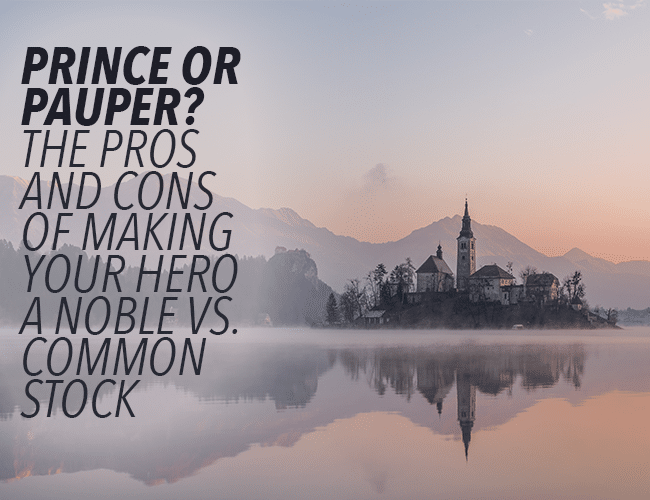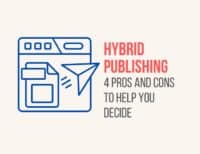Every author has had to tackle following question at some point, whether it be Shakespeare or J.K. Rowling: Are the heroes of my tale going to be of common stock or noble heritage? That is, will I create a lower class or upper class character? It has been a heated topic of debate since long before the Brothers Grimm ever picked up a pen, and it’s a debate that continues on to this day.

The debate as to which is better is multifaceted, and tropes from both ends of the spectrum have become commonplace.
Prince or Pauper?
Harry Potter is essentially wizarding royalty raised in humble surroundings. Luke Skywalker is unknowingly of noble birth, yet he grows up on a moisture farm which is situated on a backwater planet. There have even been indications that both Finn and Rey in Star Wars: The Force Awakens are of noble descent, despite their lowly upbringings as either soldiers or scavengers.
On the other hand, working-class peasant heroes are also popular in fiction: Tris from Divergent, Katniss from The Hunger Games, and Kelsier from Brandon Sanderson’s Mistborn trilogy all demonstrate the deep relatability and authenticity that having a common protagonist can lend to your story.
Which is the superior choice? I think that largely depends on how an author intends to relate to his or her audience. Let’s look at some of the pros and cons associated with choosing an upper class character over a commoner.
The Power of Nobility
The archetype of a noble raised in obscurity is oftentimes amongst the most beloved. In many ways, it’s a natural to desire to be the long-lost heir to some famous lineage. Thus, we enjoy heroes who are noble and have been raised in obscurity. In many ways, the notion also reinforces the idea that seemingly ordinary people can be as special as the heroes we grew to love as children.
This appeal, however, can also be a double-edged sword. Making your hero an upper class character can often make your character less relatable, since most of your audience will not secretly be of noble descent.
The Commoner's Advantage
There is another option to consider however, since the noble archetype has become a bit trite as of late.
I believe that science fiction and fantasy stands to benefit from more common heroes. The concept of dashing princes saying the day is becoming cliched and predictable, and I believe working class heroes can bring a fresh perspective. Additionally, the notion that everyday people have the power to change and affect the world around them, is particularly empowering or endearing to readers. Moreover, to some the concept of birthright may also seem archaic and foreign.
The allure behind making your hero a commoner is that it reinforces the notion that all people have value. In many ways, it reminds us that strong societies are created through the blood, sweat, and tears of everyday people who choose to do what is best for the community, and not just what is best for themselves.
Does this mean, however, that “everyone’s a hero”? Certainly not. You see, despite being commoners these heroes are exceptional in their own right, due to the sacrifices they make and their choice to oftentimes go down the road less traveled.
A Hero Your Readers Will Love
Prince or pauper, whichever choice you make, be sure to communicate that choice clearly. Let your hero’s true nature shine through, and let that narrative shape how you relate to your audience. For in the end, regardless of the choice you make, remember that there’s always a way for your heroes to leave a mark on the world and empower your epic tale.
Are there other advantages to writing about a lower class or upper class character? Let us know in the comments.
PRACTICE
Do you prefer to write about commoners or nobles? Today, challenge yourself to do the opposite. If you write about kings and queens in a high-fantasy saga, try your hand at telling a story from a commoner's perspective. If you usually write stories about average Joes who have to buy groceries and pay the bills like the rest of us, tell us the story of someone in a more privileged space.
Take fifteen minutes to write. When you're done, share your story in the comments, and don't forget to leave feedback for your fellow writers!







I find this article very interesting. As a business coach, I am interested in sharing about opportunities for prospective business owners. This same question of Prince or Pauper applies to the prospect for starting a business. Is the prospect a wealthy and highly trained Prince or are they more likely to be a more common person facing challenges?
I totally get your point I would say for Me it would be more of a common person facing challenges what you sent to me about the prospect has got me thinking I have always wanted my own business but have no idea were to start thank you for giving me something to think about
Being the poor, lonely, down, unsure hero can make us feel better about ourselves. We can understand them better. I can’t relate to being rich. But, I can relate to being without. I would want my hero to see what I have seen. And, be triumphant. Like I want to be….
I agree with you it can make you feel better about your self I feel that is a hero you can love more
Ok fifteen minutes
My question: what is the difference between noble or common? Let’s do a quick dive down to the genetic level. Let me see … noble or commoner start with the same pairing of 23 pairs of chromosomes to make a new human containing 46. Noble or common, it is the same. 23+23=46.
Noble stock, yes let us use the term of the cattle pens, noble stock that is bred true can lend itself to several genetic abnormalities. Hemophilia is thought to be one. Constant inbreeding can cause others. Want proof? Look at the many breeds of dogs that have problems unique to inbreeding; hip dysplasia. Talk to the dog with dysplasia if you think that makes that breed superior.
If noble birth is so superior, then why did not the noble’s of Europe discover the polio vaccine? Or the vaccine for small pox? Was Einstein of Noble birth? Michelson, the man that determined the speed of light? Farraday? Richard Feynman? Stephen Hawkings? These people are noble on their own merits, not because of some inbreeding blue-blood nobility.
I like right about a noble but loses everything and in now a commoner and was to work to get it back,
I like to make my hero’s strong women who what they have to do to keep people safe. They are just like every day People.
I normally write about common people, but I have several stories that are different: a queen who crossdresses to best rule her country, an immortal world-ruling politician, a rich boy with amnesia, etc.